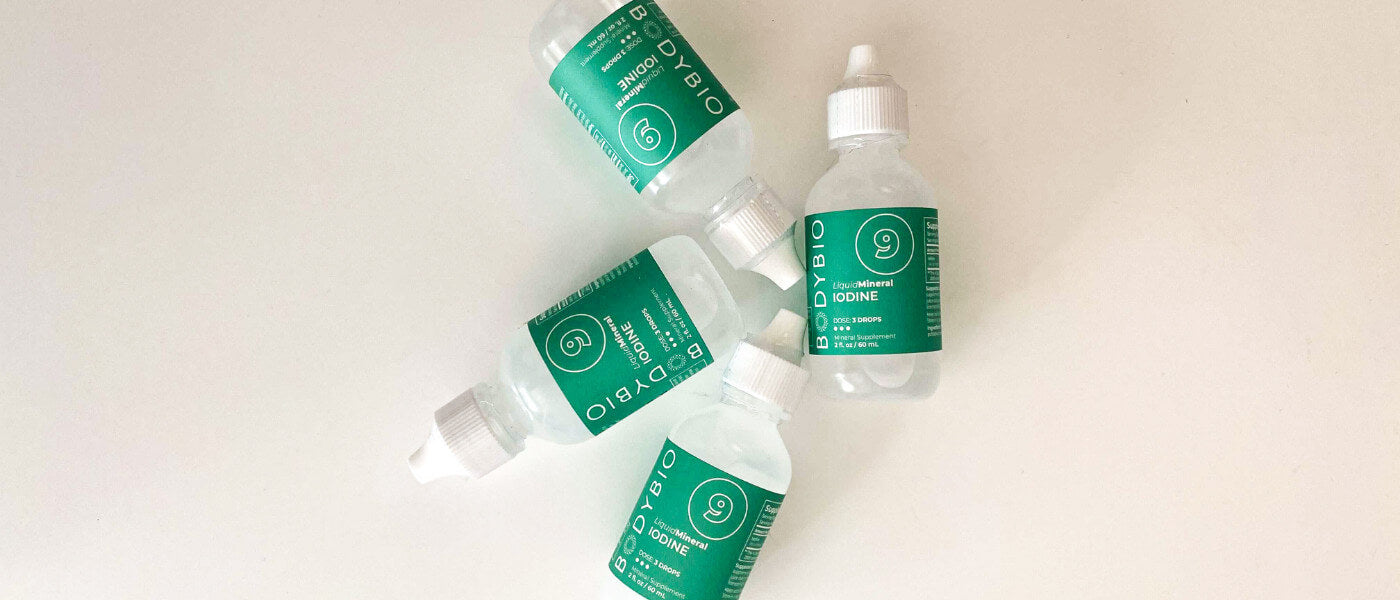The Importance of Iodine: Iodine Benefits, Sources, and More
Key Takeaways:
Key Points:
- Iodine is an essential trace mineral required for thyroid, immune, nervous system, and breast health in women.
- Many people, especially women, may be iodine deficient or insufficient, but supplementation requires careful dosing to avoid toxicity.
- Iodine food sources are primarily animal-based foods, including seafood and dairy, so those on a vegan or vegetarian diet may want to consider supplementing to meet their daily needs.
The benefits of iodine — a trace mineral critical to thyroid function, immune health, nervous system regulation, breast health, pregnancy, and fetal development — are many. But many people, even some doctors, do not think about iodine when thinking about critical nutrients for health and well-being. In this article, we’ll review the many uses of iodine, its benefits, symptoms of deficiency, sources, and more.
What is Iodine?
Iodine (I) is one of the nine essential minerals for the body that facilitate enzymatic reactions, produce hormones, enable cellular communication, and accomplish dozens of other functions. While we don’t need as much iodine as we need other major minerals like magnesium and calcium, iodine is still essential to our health, particularly thyroid health.
Unlike other nutrients, our bodies can not synthesize iodine on their own. We have to ingest iodine through our diet and supplementation, if needed, to get enough. However, iodine is also a nutrient that has a very narrow range of safety, meaning that it can be quite easy to get too much, especially when supplementing.
Iodide vs Iodine
Iodide is a reduced salt form of iodine that is taken up by the body and used in various biological processes, like hormone synthesis. Iodide is absorbed through the stomach and the first part of the small intestine, the duodenum. Once in circulation, there is a transport protein called the sodium-iodide symporter that is present in several tissues—for example, the thyroid, cervix, breast tissue, and salivary glands—that allows iodine to be used in the cell.
Iodized Salt
When you buy iodized salt, what you often get is salt combined with potassium iodide. Many countries—including the United States and Canada—have had salt iodization programs since the 1920s to prevent widespread deficiency in the general population.
However, salt manufacturers in the USA do not have to iodize their salt. Many processed food manufacturers, from which it is assumed that most Americans get their salt intake, do not add iodide to their salt.
If you use sea salt, kosher salt, Himalayan salt, etc., these salts are not iodized either, though they do contain some trace minerals.
Iodine Health Benefits
The main benefits of iodine are maintaining thyroid health, immune function, and brain and nervous system support. Let’s take a closer look at each of these benefits.
Iodine for Thyroid Health
One of iodine’s biggest roles in the body is to support the thyroid in producing thyroid stimulating hormones (TSH) and its active metabolites, T3 and T4. Without iodine, the production of these hormones may decrease, which could eventually lead to hypothyroidism.
The thyroid also requires selenium to use iodine for thyroid hormone synthesis, so selenium and iodine levels should always be considered together when evaluating supplementation for thyroid health.
Iodine for Fetal Development
The body’s iodine needs are more pronounced during pregnancy. In fact, the Recommended Dietary Allowance (RDA) of iodine for pregnant women increases from 150 to 220 mcg/day.
The increased need for iodine during pregnancy is due to the fact that iodine is essential for fetal development, particularly for fetal thyroid gland development. During early pregnancy, the fetus depends entirely on the mother’s thyroid hormone production; production of T4 increases by 50% during pregnancy to help compensate for this higher demand.
Iodine deficiency can contribute to diminished cognitive and neural development in infants and children.
Iodine for Immune Function
Iodine is also critical for proper immune function. Besides being inherently antiseptic, killing all single-celled organisms, iodine and thyroid hormone together appear to provide constant surveillance against abnormal cell development. It also protects against abnormal bacterial growth in the stomach such as H. Pylori overgrowth. Iodine can also coat and neutralize both biological and chemical toxins.
As for the immune system itself, iodine seems to increase immune cell function. This effect is due to iodine itself, rather than an increased production in thyroid hormones. However, additional research shows that, once again, too much iodine can easily cause immune system dysfunction.
Iodine for Fibrocystic Breasts
Iodine deficiency is indicated in women who have fibroids, or non-cancerous lumps, in their breast tissue. These abnormal growths usually appear and disappear based on the menstrual cycle, or they may build up over time.
Since iodine protects against abnormal cell development and proliferation, adequate iodine levels may prevent these fibroids from occurring.
Iodine for Goiters
When a thyroid becomes enlarged, it is called a goiter. Goiters can sometimes develop as a result of iodine deficiency, although goiters are significantly less common in the US than in other countries. Adding iodine-rich foods to your diet can reduce the risk of goiters and, in some cases, reverse them.
Since goiters can also be caused by too much iodine, make sure you speak with your practitioner before using iodine supplementation to manage goiters.
Iodine for the Nervous System and Cognitive Function
Many parts of the brain appear to be affected by a lack of iodine, including the hippocampus, neurotransmitters, the protective myelin that surrounds our nerves, and the process of cognition itself. Further research needs to be done on iodine’s role in brain health, but we can surmise that maintaining good iodine status is supportive of the nervous system and brain health.
How Much Iodine Do You Need Daily?
While increasing iodine intake in your diet or supplementing iodine has many benefits, maintaining optimal iodine requirements can be difficult. In particular, excess iodine intake may even initiate or aggravate hypothyroid symptoms, so supplementing iodine should not be taken lightly if you already have or are predisposed to hypothyroidism.
|
Age |
Recommended Dietary Allowance for Iodine In Micrograms (MCG) |
|
Birth - 6 Months |
Formula or Breast Milk Only |
|
Infants 7-12 Months |
Formula, Breast Milk, or Diet Only |
|
Children 1-8 Years |
90 MCG |
|
Children 9-13 Years |
120 MCG |
|
Teens & Adults 14+ |
150 MCG |
|
Pregnant Women |
220 MCG |
|
Nursing Women |
290 MCG |
Keep in mind that the RDA represents the absolute minimum requirement for function, so your individual needs may be higher. To avoid toxicity, make sure you’re aware of the Upper Limits (ULs) of Iodine as well.
|
Age |
Tolerable Upper Intake Levels for Iodine In Micrograms (MCG) |
|
Birth - 6 Months |
Formula or Breast Milk Only |
|
Infants 7-12 Months |
Formula, Breast Milk, or Diet Only |
|
Children 1-3 Years |
200 MCG |
|
Children 4-8 Years |
300 MCG |
|
Children 9-13 Years |
600 MCG |
|
Teens 14-18 Years |
900 MCG |
|
Adults 19+ Years |
1100 MCG |
|
Pregnant & Nursing Women 14-18 Years |
900 MCG |
|
Pregnant & Nursing Women 19+ Years |
1100 MCG |
Iodine Deficiency
Iodine deficiency or insufficiency is actually very common, especially among women, since iodine is present in the mammary tissue and cervix in addition to the thyroid and salivary glands.
You may be more susceptible to iodine deficiency if you:
- Don’t consume iodized salt
- Are pregnant
- Are vegan or do not consume many animal products
- Live in a region with iodine-deficient soils
- Consume goitrogen-containing foods (foods that interfere with iodine uptake in the thyroid).
Symptoms of Iodine Deficiency
Symptoms of iodine deficiency may look similar to many hypothyroid symptoms, since low iodine can exacerbate hypothyroidism. Possible iodine deficiency symptoms include:
- Fatigue
- Sensitivity to cold
- Weakness
- Constipation
- Unintentional weight gain
- Dry skin
- Visible goiter (an enlarged thyroid)
- Difficulty swallowing
- Difficulty breathing when lying down
- Hair loss
- Brain fog
- Depression
For more information, please see our article on how to tell if you have an iodine deficiency.
Iodine Toxicity
While rare, iodine poisoning can occur if someone consumes heavy doses of iodine, typically from over-supplementation. Symptoms of toxicity include:
- Diarrhea
- Nausea and vomiting
- Burning of the mouth and/or stomach
- Fever
In extreme cases, iodine poisoning may cause a weak pulse or coma.
Long-term iodine overdoses can increase the risk of hyperthyroidism, goiter, thyroid inflammation, and thyroid cancer.
Sources of Iodine
You can get iodine from your diet as well as through supplementation.
Iodine-Rich Foods
Unless they are processed and iodine is added, plant-based foods are not a good source of iodine (with the exception of nori seaweed). If you are generally healthy and following a whole-foods-based diet, you can get adequate iodine intake from the foods below, especially seafood and dairy products.
|
Food |
Serving |
Micrograms (MCG) Per Serving |
|
Baked cod |
3 oz. |
158 |
|
Flaked nori seaweed |
2 tbsp. |
116 |
|
Cooked oysters |
3 oz. |
93 |
|
Plain, nonfat greek yogurt |
¾ cup |
87 |
|
Nonfat milk |
1 cup |
85 |
|
Hard-boiled egg |
1 large |
26 |
|
Cheddar cheese |
1 oz. |
15 |
|
Cooked beef liver |
3 oz. |
14 |
|
Cooked shrimp |
3 oz. |
13 |
You might see foods like processed wheat bread, enriched pasta, and iodized salt in other sources on this topic, but we recommend sticking to whole food sources of iodine. Nature knows best!
Iodine Supplements
Iodine supplements benefit those who are deficient or low in iodine due to a thyroid condition, pregnancy, veganism, or low animal food intake, etc. Most iodine supplements are made with either potassium iodide or sodium iodide.
Note: It’s always a good idea to work with a practitioner before starting to take iodine if you have a preexisting condition.
Experience the Benefits of Iodine with BodyBio’s Liquid Iodine Supplement
As you can see, the benefits of iodine are far-reaching, yet iodine either gets a bad rap or goes unnoticed in the nutrition world. It is an essential trace mineral that supports thyroid hormone production, immune function, and nervous system and brain health. Women especially need iodine due to its use in breast tissue and the cervix. Yet iodine is one of the most finicky nutrients to supplement; too much or too little can easily cause problems and symptoms, including exacerbating hypothyroidism.
With BodyBio’s Liquid Minerals, you can also use your sense of taste to test whether supplementation is right for you. For iodine, simply add the recommended number of drops to an 8 oz. glass of water, swish and swallow, and observe what you taste.
If you experience a sweet taste or no taste, it is safe to continue taking iodine supplements. If you experience a foul taste, discontinue––your body does not want more iodine right now. Retest periodically to see whether you need to adjust your dose or stop altogether.





